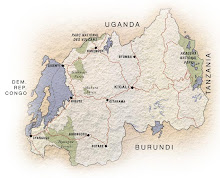Five University graduates from Canada currently interning with several organisations in Kigali on Sunday fulfilled their pledge of planting 500 cypress trees.
Assisted by10 members of Youth Association for Human Rights Promotion and Development (AJPRODHO-JIJUKIRWA), 40 residents and leaders of Amahoro village, the interns planted the trees along the newly constructed stone-paved road connecting Kacyiru-Kimicanga Road with Kinamba.
Before leaving their homeland in July, the Canadian group made a pact to directly offset the carbon emissions from their air travel by planting trees in their respective host countries.
According to Emmanuel Nzeyimana, President of AJPRODHO, the initiative is in line with environmental protection. He emphasised that planting trees is not merely a way to beautify one’s surroundings, but also good for health.
“We have to understand that there is a positive relationship between environmental protection and health for sustainable development,” Nzeyimana underscored.
He asserted that tree planting combats both soil erosion and air pollution, adding said that air travel is not the only contributor to air pollution but that any road vehicle is a major burden on the environment.
“In fact, a running engine releases two times more pollution when the vehicle is not in motion. Letting the engine run for more than ten seconds produces more carbon dioxide and uses more fuel than stopping and restarting the vehicle,” Nzeyimana noted.
Crystal Milligan, one of the interns working with AJPRODHO said that 97 trees needed to be planted to compensate for the carbon released into the atmosphere by her flight between Canada and Kigali.
Kacyiru Sector youth coordinator, Christian Munyeshuri, responded that the flights of each of the Canadians had been fully compensated for with 500 trees, meaning that the interns were free to return to Rwanda again in the future.
“But I will not call you ‘the Canadians’,” Munyeshuri stated, “After today, you are our own people in Canada.”
The interns initiated the tree planting idea and given the fact that environmental protection is one of AJPRODHO’s crosscutting themes of focus, it enthusiastically offered to support the Canadians in the initiative.
When contacted, the village leaders welcomed the idea and joined the rest for they also had a plan of planting trees to combat soil erosion in the area.
All parties involved in the tree planting exercise expressed keen interest in maintaining and developing this collaboration in the years to come.
The interns were sent by the Coady International Institute in Nova Scotia, Canada, as part of a larger contingent of 16 interns currently working elsewhere in Africa and Latin America.
If you visit the link, there's a small picture of our tree-planting team. As is the norm for the New Times, some of the facts are slightly less than accurate, but regardless it's good to see the story made it to the local media (even if we had to pay them to cover it, but that's another story for another day...)












